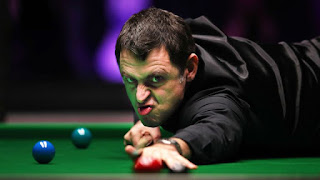The World is your Oyster
With snooker becoming a major force in the world of sport, it is only right that I dedicate a blog to snooker globally. Much is known about snooker in the United Kingdom and the Republic of Ireland but what about the sport outside our shores? If we travel across the English Channel, France doesn’t seem interested in snooker and hasn’t hosted any tournaments since the heady days of the 1980s. Moving to its neighbour Germany, I have said in a previous blog that it has a massive fan base, one of the best tournaments on the calendar, the German Open and few snooker clubs within and outside Berlin.
Ex Communist states as Latvia and Bulgaria also appreciate the game but have lost their televised events due to the pressures of increasing the snooker calendar and with Norway producing Anita and Kurt Maflin, there is little play of the sport anywhere else in Central Europe barring Malta that hasn’t produced a major player since Tony Drago.
Moving to the Middle East, snooker hasn’t been big here since the early 1990s when the last Dubai Open was sadly played and then moved to Thailand and the ill fated Bahrain Classic only lasted for one year, an event that was rather like watching paint dry. Moving across the Gulf sea, the next country that has an interest in snooker is Iran. Thanks to the former professional player, David Roe, players such as Hossein Vafaei have been produced. A player on the main tour, Hossein has had constant visa problems when trying to play in foreign events.
China of course is now well known for snooker, hosting five of the calendar’s tournaments. Heavy investment has been put into the sport in this country and children are taught the game at school. With clubs springing up across the country, the sport is widely played with new youth talent being produced all the time but breaking out on the main tour at a slower pace than expected. The main problem in China is however is ticket pricing. With high prices, few Chinese fans can afford to attend tournaments. This is reflected with empty seats at events with many fans having to watch them at home on cable and satellite networks.
Finally we move to Australia that until a few years ago hosted the Goldfields Open. This event ran for several years but then Eurosport lost the coverage and the event was confined to Australian television. An act that sealed its fate. Despite producing players such as Eddie Charlton and Neil Robertson over the years and hosting major tournaments since the 1960s, Australia doesn’t seem to show much interest in the sport and gave a very lukewarm reception to Robertson when he won his first World Championship.
From this whistle stop account of global snooker, one can see where the potential market exists and the continuing challenge to break out the game into these countries. World Snooker and Eurosport have been brilliant at promoting and televising the sport to new audiences. This however is only the first hurdle of a long process that involves severe financial investment, sponsorship and creation of clubs and tournaments. With this strategy, the sport will nurture in foreign climbs and the snooker calendar will further expand.
Ex Communist states as Latvia and Bulgaria also appreciate the game but have lost their televised events due to the pressures of increasing the snooker calendar and with Norway producing Anita and Kurt Maflin, there is little play of the sport anywhere else in Central Europe barring Malta that hasn’t produced a major player since Tony Drago.
Moving to the Middle East, snooker hasn’t been big here since the early 1990s when the last Dubai Open was sadly played and then moved to Thailand and the ill fated Bahrain Classic only lasted for one year, an event that was rather like watching paint dry. Moving across the Gulf sea, the next country that has an interest in snooker is Iran. Thanks to the former professional player, David Roe, players such as Hossein Vafaei have been produced. A player on the main tour, Hossein has had constant visa problems when trying to play in foreign events.
China of course is now well known for snooker, hosting five of the calendar’s tournaments. Heavy investment has been put into the sport in this country and children are taught the game at school. With clubs springing up across the country, the sport is widely played with new youth talent being produced all the time but breaking out on the main tour at a slower pace than expected. The main problem in China is however is ticket pricing. With high prices, few Chinese fans can afford to attend tournaments. This is reflected with empty seats at events with many fans having to watch them at home on cable and satellite networks.
Finally we move to Australia that until a few years ago hosted the Goldfields Open. This event ran for several years but then Eurosport lost the coverage and the event was confined to Australian television. An act that sealed its fate. Despite producing players such as Eddie Charlton and Neil Robertson over the years and hosting major tournaments since the 1960s, Australia doesn’t seem to show much interest in the sport and gave a very lukewarm reception to Robertson when he won his first World Championship.
From this whistle stop account of global snooker, one can see where the potential market exists and the continuing challenge to break out the game into these countries. World Snooker and Eurosport have been brilliant at promoting and televising the sport to new audiences. This however is only the first hurdle of a long process that involves severe financial investment, sponsorship and creation of clubs and tournaments. With this strategy, the sport will nurture in foreign climbs and the snooker calendar will further expand.





Comments
Post a Comment